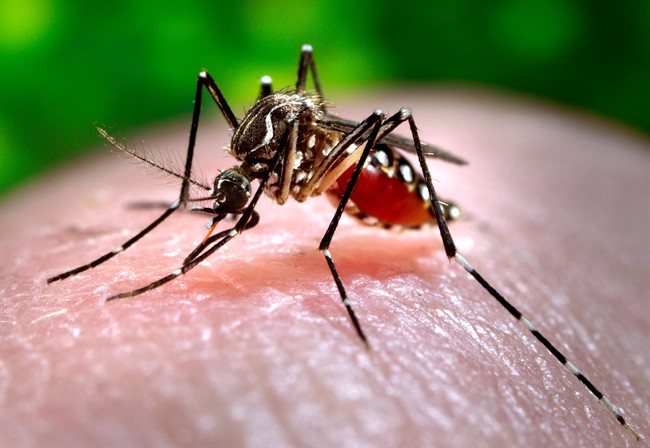Are you covered in mosquito bites once summer rolls around? New research suggests you should blame your genes for attracting the pesky insects.

American and British researchers say they’ve figured out what makes some of us appetizing to mosquitoes – pregnant women, people with a greater body mass, and how our genetics tamper with body odour are just a handful of the factors.
“With this study, we have unmasked interesting genetic control of attractiveness to mosquitoes,” study co-author, Salvador Gezan, said in a University of Florida press release.
“By investigating the genetic mechanism behind attractiveness to biting insects such as mosquitoes, we can move closer to using this knowledge for better ways of keeping us safe from bites and the diseases insects can spread through bites,” senior author, Dr. James Logan of the London School of Hygiene and Tropical Medicine, said.
READ MORE: Why some Canadians are more prone to mosquito bites than others
For their research, scientists worked with 18 identical and 19 non-identical twin sisters. The pairs all had to wash their hands before placing them in a Y-shaped tube that held a mosquito that had to choose which side to fly down to take a bite.
- ‘She gets to be 10’: Ontario child’s heart donated to girl the same age
- Bird flu risk to humans an ‘enormous concern,’ WHO says. Here’s what to know
- Shoppers faces proposed class action over claims company is ‘abusive’ to pharmacists
- Most Canadian youth visit dentists, but lack of insurance a barrier

When it came to the identical twins, the mosquitoes were equally drawn to both sisters. With the fraternal twins, though, the mosquitoes showed a preference. The researchers say this suggests that DNA plays a pivotal role – identical twins share nearly identical odours because their genetic makeup is the same.
READ MORE: Summer safety – 5 tips for a healthy, happy long weekend
The researchers say female mosquitoes tend to prefer the smell of certain people: pregnant women, people with a “greater body mass” and even diet are considerations. Eating garlic or drinking beer to keep mosquitoes away is often cited, but the researchers say there is no consistent explanation for this.
WATCH ABOVE: Dr. James Logan talks about the study and recreates the experiment.
Dr. Carl Lowenberger, a biology professor at Vancouver’s Simon Fraser University, says that mosquitoes have poor vision and spot our silhouettes. After that, their odour receptors kick in.
While their eyesight is poor, their sense of smell more than compensates.
On us, they sniff out the sweat, heat and carbon dioxide we breathe out. It’s especially the case if we’ve had a sweaty day of exercising, hiking or we’re wearing the same clothes out during a camping trip, Lowenberger said.
READ MORE: UBC scientists develop West Nile virus vaccine for birds
“Then they come close to you and they just go nuts,” Lowenberger said.
There are urban myths aplenty – if you have sweet blood, mosquitoes may find you tastier, which is among the more popular sayings.
It’s not true, though. Mosquitoes can’t distinguish blood quality.
READ MORE: Canadian travellers to St. Martin, Martinique warned about chikungunya virus
The new findings were published Wednesday night in the journal PLOS One. Read the study here.
carmen.chai@globalnews.ca
Follow @Carmen_Chai




Comments